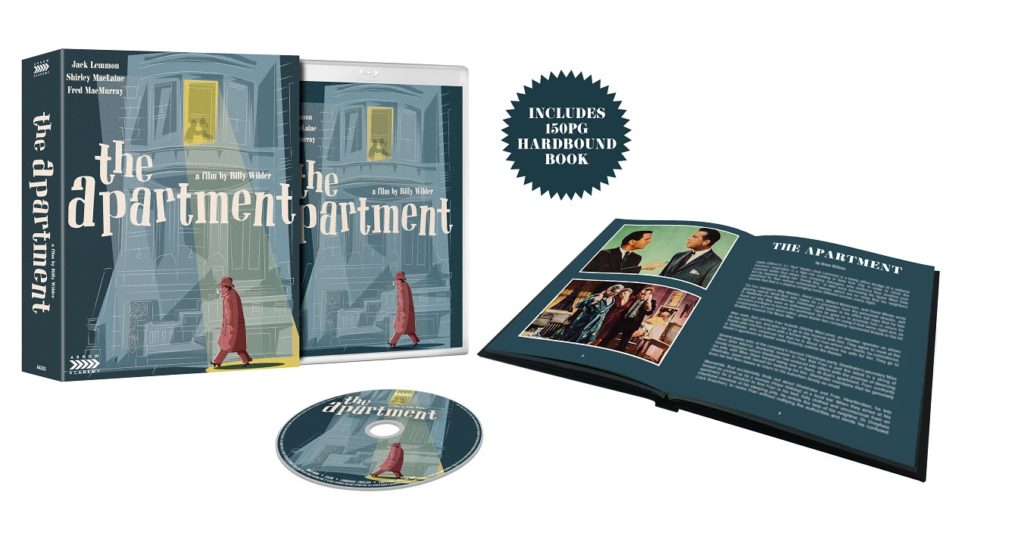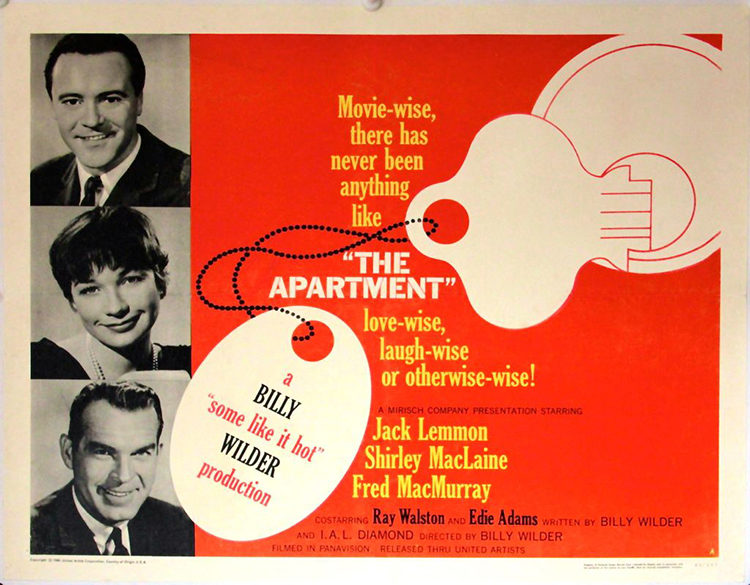Arrow Academy Releases the Holiday Classic The Apartment on Blu-Ray

At the start of the Swingin’ ‘60s lies Billy Wilder’s exquisite cultural black comedy, The Apartment. Winner of 5 Academy awards, including “Best Picture,” and 10 Academy Award nominations, Arrow Academy has released a posturing 4k blu-ray restoration of what I would consider one of the more important films that represent the 1950s in its purity.
The Apartment Movie Trailer
Wilder helped define comedy in the later 1950s with films like Seven Year Itch (1955), Some Like It Hot (1959), and Love In The Afternoon (1957). But more so than these aforementioned films, The Apartment grabs from his dabbling of drama, noir, and realism to create a piece de resistance.

Jack Lemmon plays C.C. “Bud” Baxter, a working class bachelor in New York City. This in itself needs reflection. Much like François Trouffaut’sThe 400 Blows was to Paris,The Apartment was to New York City. Wilder professes just as much care to his screenplay as he does portraying the culture, vibrancy and loneliness of Gotham. In every scene we are reminded that the city can be a place of refuge while being unforgiving. From ‘50s metropolitan fashionistas down to the cocktails constantly consumed, substance is nestled within each scene like an archaeological find. Be it the tangible like a roaring jukebox or holiday decorations of the time period to the subjective and verbal slang like “fink” or “boresville,” each trip through this film illuminates a new revelation of this era.
The film runs the gamut of the holiday season, between Christmas and New Year’s Eve. Facts and figures weigh the intro like a census bureau one sheet. Population is our weights and measures to build context. We see an expansive screen shot of endless overhead lights and people churning away at their desks. Baxter is put front and center, like the leader of a capitalistic pack. Later in the film they are all turned loose at the company holiday party like frothing wild animals.
The movie works as a societal travelogue in Vanity Affair. The plot revolves around his living space. Baxter trades his apartment to upper class married male bosses and their mistresses for the potential of moving up the corporate ladder. This is comparative advantage at its core. Yet, what seems like fair incentive to get ahead, the reality we see is a man frantically juggling schedules and being kicked out of his apartment at all hours because one of the bosses may have gotten lucky at the nearby bar. One particular scene shows Baxter in a nearby park, sitting along a string of park benches hidden by the cover of the New York skyline. The aura of black and white brings a sense of conscious loneliness. Even someone as optimistic and wholesome as Baxter has his moments.

The film moves like a cyclone as characters enter and exit often exploiting the frivolity of the moment until the film compresses into the triangle between Baxter, his infatuation with elevator operator Fran Kubelik (Shirley MacLaine) and the personnel director J.D. Sheldrake (Fred MacMurray). The dependence of Baxter’s promotion relies on the availability of his apartment to Mr. Sheldrake. However, when Baxter discovers Sheldrake’s mistress is Ms. Kubelik, the conflict arises. Kubelik realizes she is just one of many women who have succumbed to Sheldrakes’ infidelity. The outcome results in desperation and a bottle of sleeping pills found in Baxter’s bathroom. It is here where we see Baxter’s unparalleled good nature in taking care of Kubelik despite knowing that she may never fall in love with him.
Like Billy Crystal and Meg Ryan in When Harry Met Sally, Lemmon and MacLaine showcase an electrifying chemistry together. Lemmon often times livens up her even-keeled scenes with a giddy Jerry Lewis-esque demeanor. Wilder allowed the actors a freedom to explore their character beyond the script only glorified our wonderment of the two.
The Apartment – Jack Lemmon’s Bar Scene
https://www.youtube.com/watch?v=g7r4QA234sQ&t=148s
Lemmon’s humor is subtle and striking. The bar scene is iconic in taking a situation to the next level. When he is in the bar drinking his sorrows away after discovering Sheldrake’s intentions with Ms. Kubelik, his own drunkenness becomes a dimensional comedic effect without abusing the situation. He finds himself at last call dancing cheek to cheek with Margie MacDougall (Hope Holiday), a lady who takes solace into Baxter’s distant drunkenness as her own husband is stuck in a Cuban prison. “What do you think about Castro?”, she says. Lemmon’s reply is a moment of clarity “Who’s Castro?”
During the bar scene, he is oblivious to the hectic interplay of the bar itself and the rigors of the holiday patrons proving life never slows down. I mention this moment because one of the many special features includes a new interview with actress Holiday about her role and notable Edith Bunker like voice in the movie.
In the vein of The Criterion Collection on steroids, the Arrow Academy makes usage of archival footage, interviews, and commentary by film historians. In addition, the 150 page hardcover book included is a glorious achievement for Arrow. This alone is worth picking up a copy for an enhanced understanding and experience of an iconic film.

![Film: The Apartment [1960] (Arrow Legacy) Film: The Apartment [1960] (Arrow Legacy)](https://www.selectivememorymag.com/wp-content/uploads/2019/01/6772_the-apartment-640.jpg)


No Comment! Be the first one.